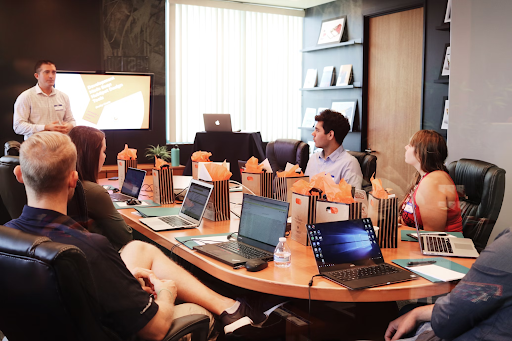
Knowledge Retention Strategies: How To Improve Training Outcomes
When planning corporate training, it can be easy to get bogged down in the details of what specific pieces of information you want your employees to learn.
But what can sometimes be overlooked is the degree to which this information will stick in the minds of your employees.
Overall, the main aim of running corporate training programs is to impart knowledge to your staff that will help them do their jobs more efficiently.
However, if they forget what they have learnt as soon as they are taught it, as per the Ebbinghaus forgetting curve, then the whole exercise would have been an expensive waste of time.
That is why implementing knowledge retention strategies is so important, because they have been proven to help employees retain information in a much more effective way.
If this is a potential you want to tap into, here are five tactics you should employ.
What are Knowledge Retention Strategies?
Before we look at the tactics, it is worth clarifying what we mean by knowledge retention strategies.
In simple terms, knowledge retention relates to a person’s ability to retain something they have learned in their minds over a prolonged period of time.
Knowledge retention strategies, in the corporate sense, refer to how this information is embedded into an employee’s long-term memory, which they can then recall as required to do their work.
How to Improve Training Outcomes?
Now you know what knowledge retention strategies are, here are some ways you can improve your corporate training outcomes with them.
- Create Content that Engages Your Employees in Different Ways
One thing you should have realized about your staff by now is that every one of them is different. Therefore, you can’t expect them to respond to a uniform training program unilaterally.
People prefer to learn in different ways. For instance, some like to listen to audio recordings or watch videos, while others like to have things written down or explained to them in a traditional classroom manner.
Therefore, it follows that to help your staff retain the knowledge in the most effective way, you should create training programs that incorporate a mix of engaging content forms.
In practical terms, this might involve starting the training with a quick verbal introduction before showing them a video. Then, you might invite them to do some reading before putting on a podcast.
If you are delivering your training through a Learning Management System, just make sure it allows you to draw upon various forms of content.
- Offer Blended learning
If you really want to ensure that your training content engages staff members as well as it can, then you should offer blended learning within your professional development programs.
Blended learning is a method of training that is delivered in both a face-to-face manner (either through webinars or other types of live participation) and also through a learning management system.
It can be very successful because it offers the measurability, flexibility and convenience of an LMS with the human touch of personal training to create a much more memorable educational experience.
By implementing blended learning within your training program, particularly in the form of microlearning, you can choose to run webinars or in-person sessions for more crucial or significant topics.
Additionally, you can create online courses via your LMS to ratify the key takeaways of what you want them to learn – which they can review as many times as they want until the knowledge sticks.
If you provide your employees with this repetition of information and easy access to it, they will more likely remember what they were taught.
- Motivate Through Gamification
It is easy to forget that the more motivated a person is to learn, the more likely they will be to retain knowledge. Subsequently, many corporate training programs now include gamification elements in an effort to increase their staff’s willingness to learn.
Typically, gamified elements include earning badges and points or being on a leaderboard (which can all be integrated with most LMS platforms).
These aspects tend to get people’s competitive juices flowing and make them more engaged and inclined to learn and retain what they are being taught.
- Group Learning
Another good way to ensure your staff retain the information they are taught during your corporate training sessions is to introduce group learning activities into the mix.
This can be a very powerful way to engage your employees in professional development activities and reiterate some of the most salient points you want them to remember.
For corporate learning initiatives, there are several options for group learning available to you. One of the most popular is to include creating a Q&A forum in your LMS where staff can ask questions, generate ideas, provide each other with support, and express opinions.
Additionally, group projects can also be an effective way to increase employee engagement and knowledge retention because if staff are empowered to complete different parts of a task, it can provide them with a new level of accountability.
- Regular Assessments
If you really want to improve the training outcomes of the professional development programs you implement, then you will need to subject your staff to regular assessments of what they have learnt.
This could take the form of ‘true or false’ or multiple-choice questions that can test employees on the degree to which they have remembered information they learnt during their last training session.
This can easily be created in your LMS as a follow-up assessment and can be used as a measure of how successful your program has been, and whether any given staff member needs any further training (such as a refresher course) in any particular area.
Conclusion
If you want to make sure your employees remember the key points of what they have learnt in your training programs, you are going to have to apply some effective knowledge retention strategies to them.
Thankfully, the tactics outlined above will go a long way towards helping you to minimize the amount of information they forget in the days and weeks after these sessions.
Therefore, if you implement them, your business should significantly benefit through the increased levels of productivity, efficiency and motivation your staff will display.
It might take you a bit of time to set them up, but ultimately, you’ll be rewarded for your efforts manyfold later down the line.
FAQs about Knowledge Retention Strategy
Here are some answers to questions that are regularly asked about knowledge retention strategy.
What is a knowledge retention strategy?
Essentially, a knowledge retention strategy is one that aims to better help people absorb new information and retain it in their long-term memory for later recall.
How to test for knowledge retention?
There are several ways in which companies can measure how much information an employee has retained from their training programs.
One of the most popular is to analyze the results of their learning assessments and then compare this to their baseline knowledge before training to see how they have improved.

